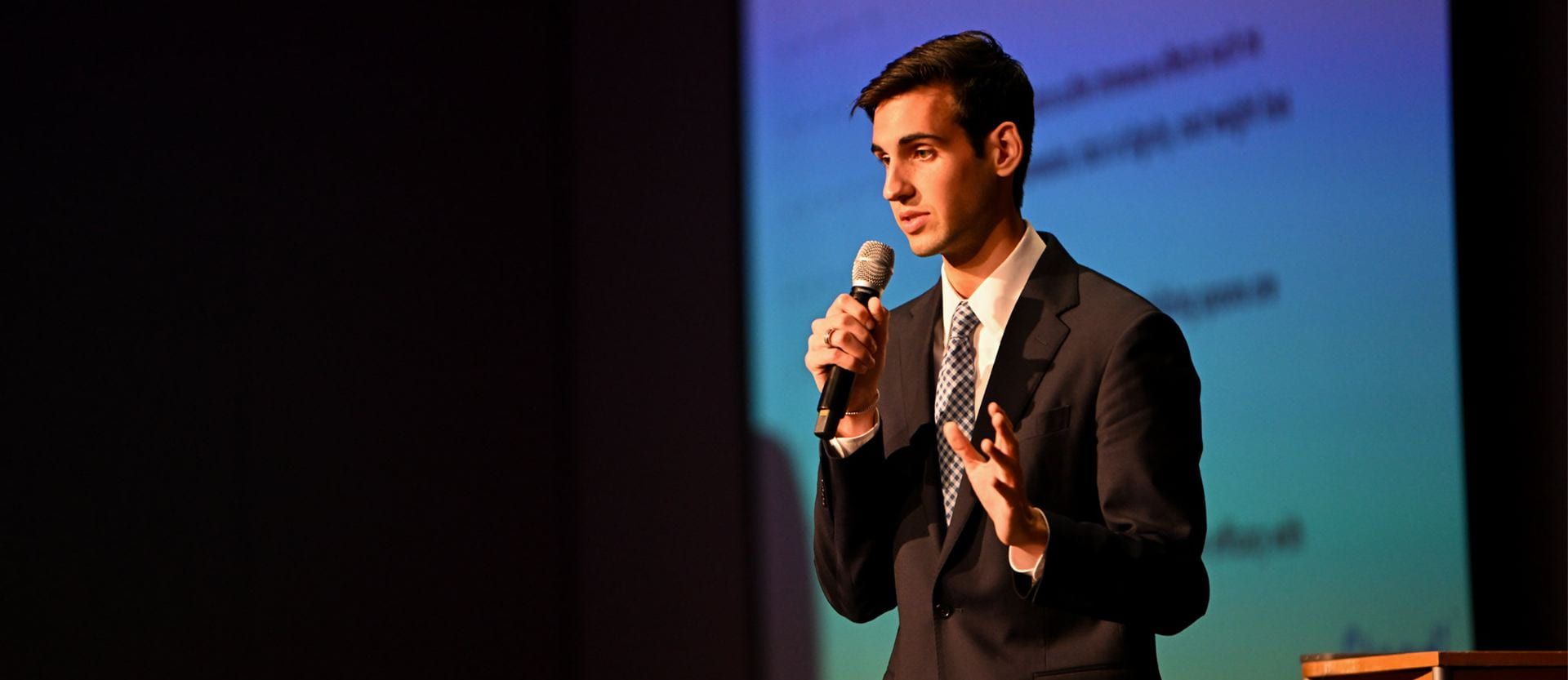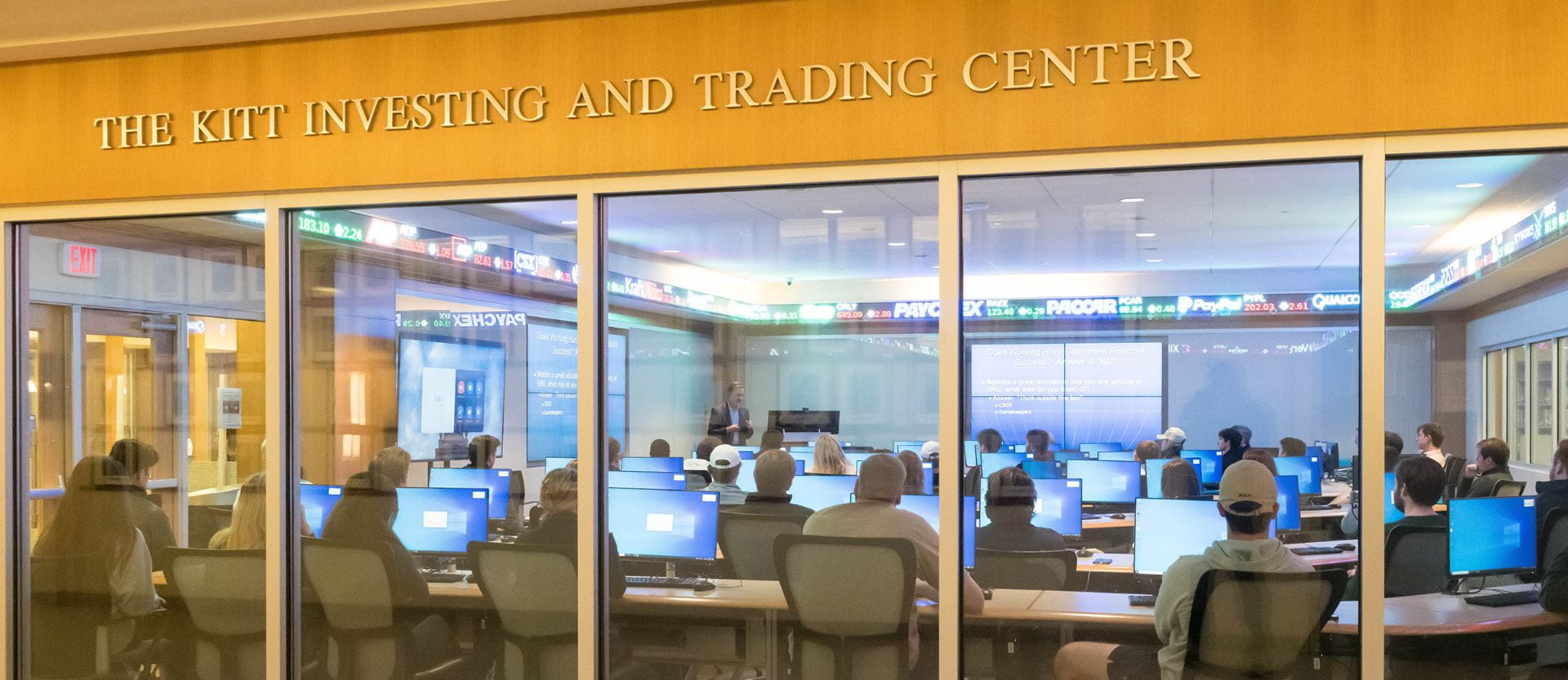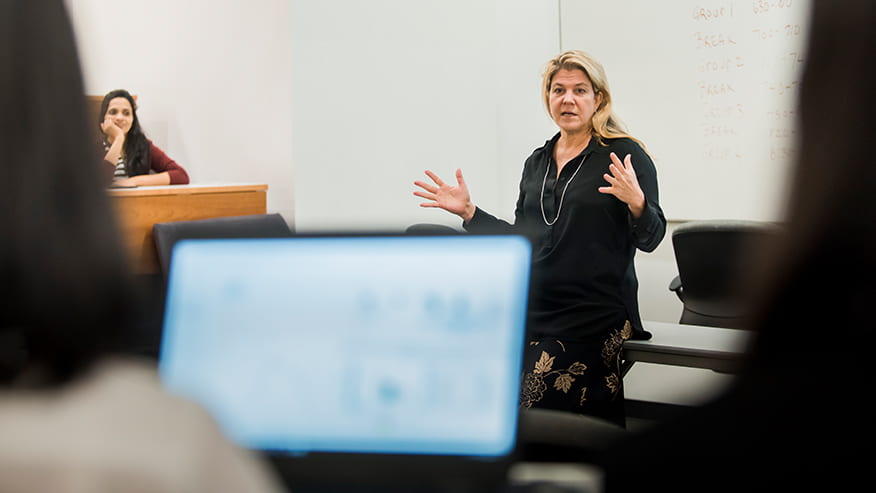Last October, six of the world’s largest and most influential tech companies waged a pitched battle. At stake: domination of the rapidly expanding field of cloud computing. The big three were there — Amazon Web Services, the industry’s market-leading goliath, Microsoft Azure and Google Cloud Platform — as well as a trio of would-be contenders in the international, multibillion-dollar field. Over two grueling weekends, the companies went head-to-head, searching for weaknesses to exploit, trying to predict and counter their rivals’ next moves.
Dubbed “The Battle for the Cloud,” this virtual competition, designed to give MBA students real-world insights into what it means to compete in today’s marketplace, was part of a newly launched program implemented to continue the Cox School’s global business offerings in spite of COVID-19 limitations.
“When the pandemic hit, travel came to a sudden halt and everything went virtual,” says Cox Assistant Dean of Global Programs Linda Kao. “We felt the need to keep students engaged, inspired and thinking globally. War Games are pedagogical and experiential. MBA students working together across borders, cultures and sometimes languages and time zones adds that real life experience.”
Kao, along with Arjan Singh, business strategy consultant and lecturer, and David Jacobson, international business law expert and Cox adjunct professor, worked as a team to develop the virtual program. The role-playing course simulates the moves and countermoves companies make in the real world and teaches participants how to assess a rival’s advantages and potential weak spots. “Gaming is a very common toolkit that’s used in some of the largest companies in the world,” Singh says. “But it’s not a skill set that has traditionally been taught in any business school, which is why we wanted SMU to take the lead in this.”
Learning Through Simulation
In the immersive program’s first outing, students from the Cox School competed against their business school peers at IPADE, one of Latin America’s premier universities and a longtime SMU Cox partner invited by Kao to take part in this preliminary run. On the first day, the competitors learned the fundamentals and core concepts of war gaming, and they gained insights into the importance of competitive intelligence and scenario planning in reacting swiftly and decisively to changes in the marketplace.
The second day included more training, coaching sessions and the selection of teams, with three teams of six students designated for each school, pulling from a variety of experiences and skill sets. “Some are executives, some are engineers, some are entrepreneurs,” Jacobson says. “These are people who really want to learn a skill that they know will be valuable and that they can’t get elsewhere in the business school world.”
The third day was the moment of truth: the war game itself. On the day of competition, the teams finally learned, in a random draw, what companies they would be representing. Team one was Oracle Cloud. Team two was Amazon Web Services. For the students who perhaps didn’t draw the strongest real-world team, it was time to buckle down and get creative. “They have to come prepared,” Singh says. Not long after learning the identity of their company, the war was on. “It teaches them agility to be able to gain a very fast, comprehensive mastery of the situation and to quickly develop strategies based on what they’re facing,” says Jacobson. “It’s a critical skill.”
Mirroring the Real World
Everything about Singh’s course is designed to replicate real-world industry skirmishes, right down to its selection of judges, which, during the fall competition, included executives from Microsoft, IBM and SAP. “We tell the students: Look, this is not an academic exercise,” says Singh. “You actually have to build strategies and defend them, and you’re going to get judged by people who are actually working in the industry.”
The first “Battle for the Cloud” was so successful that SMU Cox is now hosting and planning several other war games. In the current battles, participants hail from some of the top universities in Europe, including IE University in Spain and Berlin’s European School of Management Technology (ESMT). While the inaugural outing last fall was a battle between SMU and IPADE students, in these latest virtual competitions, the teams are a mix of individuals from the different schools. “We got a lot of feedback saying, ‘We would love to be introduced to the other students,’ ” says Singh. The change, sparked by popular demand, has been a win-win. In addition to learning how to create innovative strategies for the companies they represent, the students are also learning how to collaborate — under rigorous, time-intensive situations — with other like-minded students from around the globe.
In the competitions, teams are judged on four criteria: insight (how well they understand the dynamics of the business and the companies they’re representing), accuracy (how well their strategy and business models reflect the reality of their company), creativity (what kinds of intellectual sparks they generate in developing strategies and defending conclusions) and foresight (how well they did in looking into future opportunities). “You literally have to figure out what game each business is playing,” says Singh.
Judges in these latest battles include a former global CIO of Siemens, a leader from Microsoft Azure and a scientist at Amazon who was the head of AI and machine learning for the cloud. In many ways, it’s an opportunity of a lifetime for students trying to think like corporate warriors. Their teams are not only competing as Microsoft or Amazon, they’re learning from top-level representatives at those very companies what they got right and wrong and how they might have done things differently. “These are all people who are living their lives in this space,” says Jacobson. “So the students get insights, but they also get to rub shoulders with people who are leaders in the industry.”
Applying to a Changing Business Environment
The concepts and strategies students learn in these virtual competitions are applicable to a whole host of industries, not just cloud services. Future competitions will focus on situations & business sectors heavily impacted by the COVID-19 pandemic. Singh and Jacobson are working on such future incarnations as “Battle for the Cruise Ship” (how the industry’s biggest cruise lines will come back in a post-COVID world), “Battle for the Conference Call” (Zoom versus Microsoft Teams versus Google Meet, in a war for videoconferencing supremacy) and “Battle for the Future of Work” (learning which businesses, cities and technologies will thrive when fewer workers are returning to the office). “We’re looking at the really compelling challenges that are facing businesses and society,” says Jacobson, “and finding ways in which businesses that are trying to address those challenges are going to compete with each other to win.”
At the “Battle for the Cloud” competition last fall, Amazon Web Services, which controls a third of the cloud-services market, might have seemed to have an insurmountable advantage. But teams aren’t judged on where they start out but rather on what they do with what they have. In the end, Chinese e-commerce company Alibaba emerged triumphant. “Winning in a war game is [about] building a sound strategy,” says Singh. “You’re creating something that makes sense, which is realistically aligned to the money you have, the people you have, the resources you have.”
The fall 2020 competition was held virtually because of the pandemic, but the decision has clear advantages, opening up future games to any and all international students. The pivot was quick, and it reflected many of the principles — creativity, flexibility, thinking on one’s feet — that the program organizers hope to impart to the participants. “These competitions train people to be able to look over the horizon and anticipate the unpredictable, the unimaginable,” says Jacobson. “And then you have to contemplate how you would respond so that your company, your organization, your entity, your school comes out stronger on the other side.”
Although the program was born of necessity, it’s been so successful that other international partners want to take part. José Esteves, associate dean for MBA and Tech MBA programs at IE Business School in Madrid, was excited to be a part of the War Games experience in January and February of this year. Esteves wrote Kao a note thanking the Cox School for allowing IE “to collaborate in this fantastic challenge and also for the amazing work and effort that SMU has done.” He indicated that IE would like to collaborate on more projects with the Cox School.
SMU Cox plans to invite more partner schools to participate in the future. When it is safe to return to international travel, Kao says she would like to broaden the program to include in-person War Games on campus at Cox or on location at partner schools in addition to, but not as a replacement for, the traditional Cox School GLP experience.









